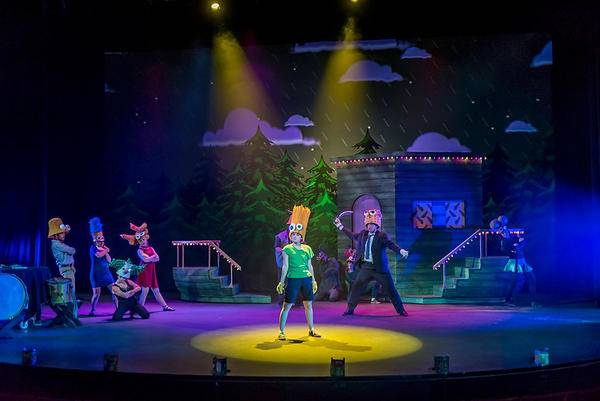A perfect stage greets the audience who arrive to see Mr. Burns – a post-electric play. The curtain is up, there’s a campfire crackling, a pleasant woodsmoke smell, and a night sky with twinkling stars and wispy clouds that actually move through the set. It feels like the Fireman from Fahrenheit 451 is going to sit down any second and tell us that he has most of Psalms memorized, to add to our collection. The chairs he’d sit in are actual living room chairs, complete with couch…and I couldn’t decide if, given the subject matter, opening with a couch gag would be a good or bad move. That feeling, that wondering if what happens next would be good or bad, stayed with me the entire evening.
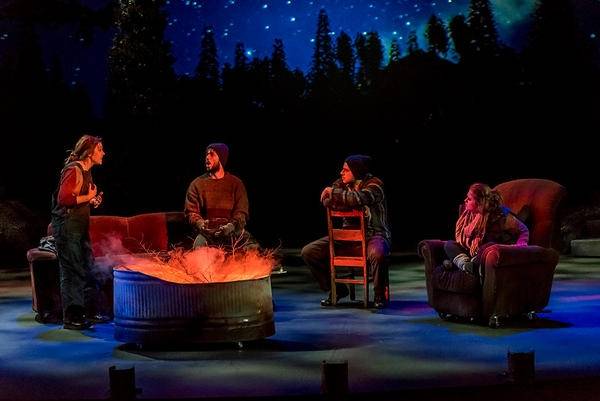
I was prepared to like this play. I’ve enjoyed post-apocalyptic tales since before they were the pop-culture darling; The Simpsons is a thing that was forbidden in my childhood home, so as an adult I take a good deal of enjoyment from watching it; Cape Fear is a film that I respect although I’ve only seen the remake. In short, I had my name on this review since the season was announced. Reading the program, I recognized several of the cast as players I’ve seen in previous plays around town. It has a lot going for it, in my mind.
But let’s look at it this way for a minute: say a play is a body, a physical, human body. To stand upright, a play needs a skeleton, muscles, and a small thing that often gets overlooked: connective tissue.
The play’s concept – that The Simpsons is the singular piece of pop culture that would resonate among most apocalypse survivors – is a strong one, and allows for exploration of memory, comfort, humor, entertainment, and cooperation, as well as identity and evolution. There’s your skeleton.
The cast and crew provide the musculature, filling out the body and covering the skeleton. The production values for Mr. Burns are quite impressive: the sets are intricate and realistic, the props are very unique and the gunshots convincing. Costume designer Nicole Zausmer and scenic designer Jaclyn Zimmerman are to be thoroughly applauded. Jordan Coughtry did a great job with the heavy lifting of being the amateur actor with intentionally overblown delivery; his Mikado drew audible laughs from the audience. It was also quite enjoyable to discover Chris Khoshaba, whose character evolved from “standing around, being the muscle” to “center stage, spotlight” very easily and capably. And to find out that everyone was also adept at singing, when the play abruptly became a musical, well, that was pleasant, considering that I had no idea we’d be treated to a mashup of NOW-worthy pop songs from the last twenty years, and an entirely musical third act.
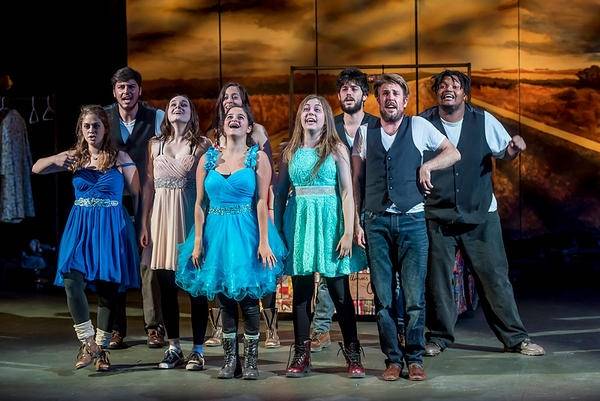
Yeahhhhhhh…about that. This is where connective tissue would have been handy. The three acts take place immediately after the collapse, 7 years later, and another 75 years after that. With Acts I and II happening so closely together, the audience gets to follow the same group of people from huddling together in the woods to being a professional acting troupe. The second act ends quite dramatically, and the next opens with no explanation or ties to the previous action other than the fact that the cast looks exactly like their grand- or possibly great-grandparents. There’s no flow, no fluidity, and it left the people who came back from intermission very confused. With no tendons joining the muscles to the skeleton, gravity just slowly pulled the entire body down to the floor.
To be fair, though, I’m not sure the audience would have been helped by any expository text. The attempts in the first act to explain how the collapse happened and its immediate effects were difficult to follow at best, and rambling or boring at worst. This is no fault of the actors: it is dull to watch people sitting around a fire for an entire act, no matter how engaging the delivery. When action happens and a stranger arrives, they complete some new social customs that are truly challenging to intuit and are a little inconsistent. The right explanation is clearly missing from the script.
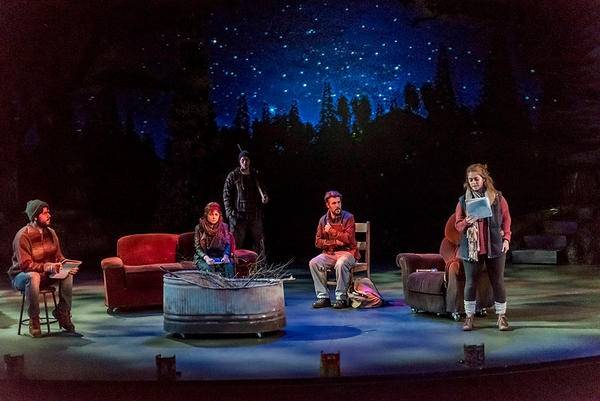
By the middle of the second act, I was beset by questions that were never answered: “how have you already forgotten the point of commercials?” and “what about all the books of episode scripts that have been published?” or even just “what about books in general, people?” and most importantly, “why are we singing now?”
I’m perfectly fine with plays leaving questions unanswered, as long as they are philosophical questions that I am free to ponder at my leisure. And even though I hate the “lady or tiger” ending, I will defend a playwright’s right to use it (although it’s cheating and I hate it). The questions that were left standing throughout Mr. Burns felt a lot more like holes and less like rhetorical provocations.
I knew going in to the third act that it would be seventy-five years later, and at best I hoped for a “Hey remember that story grandpa used to tell about…” device to give us some answers to the drama that took place before intermission. Instead, the curtain opens on a musical number, and we are watching an actual performance as staged by the descendants of the original characters. I was dismayed and irritated enough that it was hard to pay attention. Oh yeah, and it’s a musical now, which I didn’t really sign up for. I don’t mind a musical, it just wasn’t on the docket, yanno?
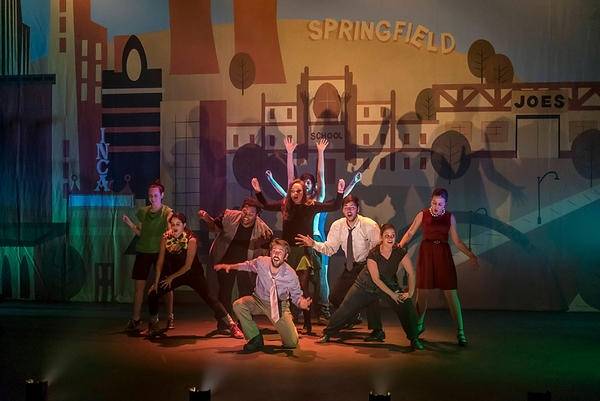
Without the necessary connective tissue, the body of this play just did not move. It was impossible for it to go anywhere, and the confusion I felt got in the way of me taking any deeper meaning from what I’d seen. I enjoyed the performers, and really wished I’d seen more of their previous works. I think hardcore fans of The Simpsons will find enough references to enjoy, and the hard work of the crew is appreciable. I’d be interested in hearing the thoughts of anyone else who has gone, and hope some folks will leave their take in the comments.
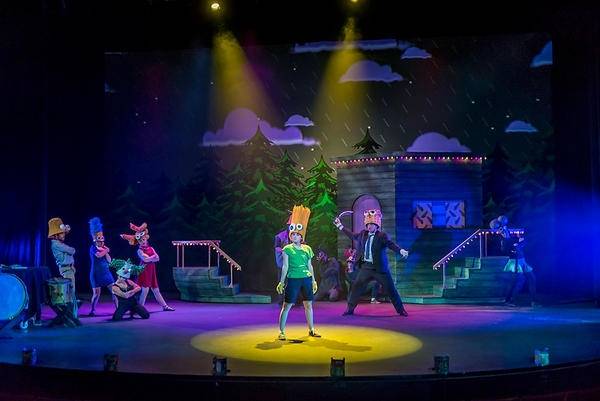
If you’re ready for an evening of considering what life would be like without electricity, and are open to an allegorical musical re-imagining of The Simpsons’ episode “Cape Feare”, then you should reserve your tickets for Mr. Burns, a post-electric play. It runs just Thursday through Sunday this weekend, and maybe the talkback on 10/20 would be worth attending. Showtimes are at 7:30 p.m. except for Sunday, which has a 3 p.m. matinee.
All images by Darrell Hoemann, courtesy of Illinois Theatre.








